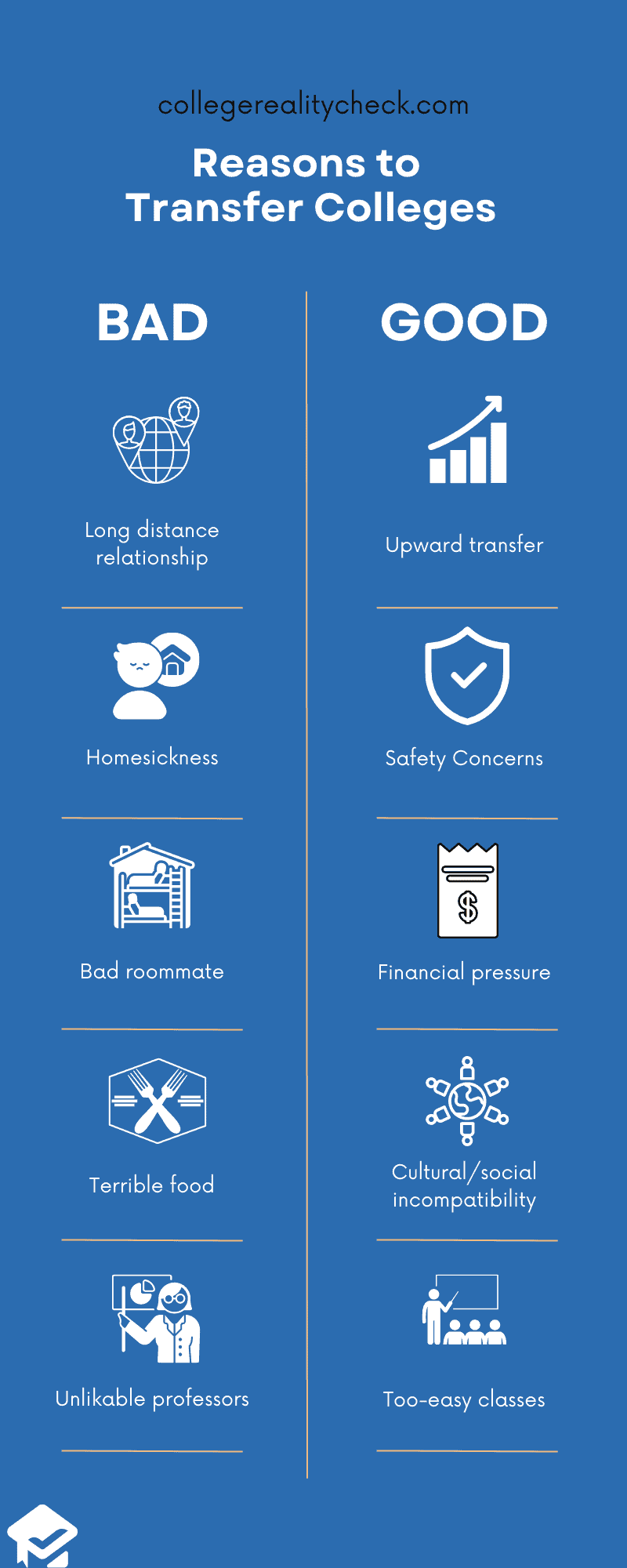8 Worst and 7 Best Reasons for Transferring Colleges
The National Student Clearinghouse (NSC) Research Center says that 37.2% of college students transfer to a different institution of higher education at least once within a span of 6 years.
With more than a third of all degree-seeking individuals doing it, switching schools is commonplace.
But just because you can doesn’t mean you should. Similarly, just because you have a reason doesn’t mean right away that it’s a valid one — some grounds for moving to another college are good, while others are bad.
Needless to say, the reason for your wanting to attend a different institution should be sound and compelling.

8 Bad Reasons to Transfer Colleges
Long distance relationship (LDR)
Bustle published the results of a survey done on members of a dating site — it turns out that 55% of individuals fall in love for the first time between 15 and 18 years of age.
So, in other words, 45% of college students still haven’t been hit by Cupid’s golden arrow by the time they transition from secondary to higher education.
If you are a part of the majority, you might feel that your heart wouldn’t be able to stand the constant longing for your other half who is either enrolled in an academic program at another college or back home doing whatever.
Fret not about the saying “out of sight, out of mind” as “distance makes the heart grow fonder” negates it.
Besides, every academic year there are approximately 140 days of holidays for college students in the US to enjoy, weekends excluded.
Needless to say, there are plenty of opportunities to deal with that LDR you have.
And also, don’t forget the fact that a college degree, once earned, is forever — not all romantic relationships, meanwhile, are etched in stone.
Homesickness
According to a study conducted by the Higher Education Research at UCLA, around 71.4% of students during their first year of college feel homesick either occasionally or frequently.
There are many things that homesickness can bring to your college experience.
For one, it can get in the way of your academic performance and social behavior. It can also leave you wanting to drop out of college and go back home to be reunited with your loved ones all over again or at least transfer to a school just a few blocks away from them.
But before you take some drastic steps in order to address your homesickness, ride it through for a while.
Mental health experts agree that homesickness in college students can go away in as short as 3 weeks, although it can last for up to a little over a year in some.
Either way, the fact remains that the unfavorable feeling of being miles away from everyone you care about isn’t forever — it won’t take long before you see your college as your home away from home.
A bad roommate
There’s no denying that having a reject from hell for a roommate can get in the way of you doing your endless readings and homework and getting some much-needed rest and sleep.
It’s just wrong — but looking for a different alma mater altogether is not right either.
Rather than bidding your current college adieu, say hello to your roommate and communicate your concerns with him or her in a cool, calm and collected manner. Set firm boundaries but be open to making compromises, too.
Things just went from unacceptable to abominable after the talk?
Then it’s time to involve your resident assistant (RA), someone who is tasked with creating a safe and supportive environment for on-campus dwellers.
Or get the roommate you can’t stand as well as who cannot stand you to submit with you a request for reassignment to put the matter to an end once and for all.
Having no friends
You are in college to earn an undergraduate degree and not win a mister or miss congeniality award.
According to a report by the Independent, more than 1 out of 6 college students say that they have no true friends. It adds that minorities, international students and students with disabilities are those who tend to feel lonely on campus the most.
So, in other words, you are not alone in thinking that you are all alone — there are many of you!
However, it’s a terrible thing to use that as a reason to head to a different college.
How certain are you that you will have at least a single pal at another institution?
What if the people at your new school ended up being snobbier?
Instead of looking for a different campus, look for clubs or organizations or activities on campus where you are likely to meet like-minded individuals. And while you’re at it, Google tips on how to break the ice and make small talk.
Terrible food
The college ranking site Niche is a standout in that it has a Best College Food in America ranking. Top-notchers, as of this writing, include UCLA, Virginia Tech and the University of Massachusetts – Amherst.
Switching to a different college just because what you are attending right now deserves a spot on The Princeton Review’s Campus Food Not So Tasty ranking (currently, Hampden-Sydney College, a private liberal arts men’s college in Virginia, is #1) isn’t recommended as there are ways of setting your sights to a degree without upsetting your taste buds.
For instance, you can switch to another meal plan option or gather up the gang and petition for college food change.
Or you may also grab the opportunity to get your hands on allowed cooking tools and fill your space with shelf-stable staples and ingredients and whip up delicious and healthy meals each time in the confines of your dorm room.
Difficult classes
There’s a reason why selective postsecondary institutions seek out high schoolers whose transcripts are littered with AP classes — a rigorous high school curriculum is linked to higher college success.
It goes without saying that college classes are more challenging than high school ones.
Still in your first or second year of college and thinking of transferring because the classes are giving you a hard time?
Then chances are that you will have the same fate elsewhere — no matter where you go, you will have to take care of those general education classes first before you face more demanding core classes.
Instead of looking for a different college to go to, look for ways to improve your study habits and time and organization skills so that you will be ready for more strenuous yet exciting classes in your senior and junior years of college.
Unlikable professors
There is no such thing as the perfect college. Similarly, there’s no such thing as the perfect professor.
Naturally, it can be difficult to get engrossed in a class if you are not fond of the person teaching it.
But instead of using it as a reason to switch colleges, use it as a tool to determine and develop skills necessary for dealing with the concerned individual, which will come in handy the next time you encounter another professor you don’t like.
Here’s another smart tip: instead of scouting for colleges where all the professors are agreeable, whose existence is highly doubtful, have a chat with some upperclassmen and ask which professors should be avoided at all costs.
Armed with the right information, you can choose your classes wisely.
Low ranking
Many high school teens who are in the process of building a college list obsess about rankings.
While there is nothing wrong with wanting to go to a highly-ranked school, it’s important to keep in mind that being better than the rest won’t necessarily make an institution the right fit for you — it will depend on things that matter to you and not to a college ranker.
Perhaps you are unhappy with the ranking of your current college but it’s the only one on your list that accepted you so you had no other choice. Or maybe it ranked high last year but has dropped a few places this time around.
Either way, the ranking of your school should not be a motive for you to transfer.
Around 90% of hiring professionals, after all, say that they don’t consider college rankings when making hiring decisions, says a national survey done on more than 2,100 business experts.

7 Good Reasons to Transfer Colleges
Too-easy classes
Earlier, we talked about the fact that having difficult classes is usually a bad reason for switching colleges.
It’s a different thing, however, if your classes are too easy to the point that it’s boring you to death.
Of course, everyone knows that working on an undergraduate degree is not supposed to be a picnic.
However, it’s a cause for alarm if your classes aren’t challenging you enough to soak in all the knowledge and skills you can get and unlock your potential.
But it’s also very important to make sure that you find your classes boring simply because they are too easy for your intellectual capacity and not because you are not interested in the material.
If such is the matter, maybe it’s not the college you are attending you should change but your chosen major.
Cultural/social incompatibility
It’s perfectly fine to wonder whether or not you made the right choice during the college application season the minute you step foot on your chosen college to commence your pursuit of an undergraduate degree.
Fret not because the feeling that you are out of place will gradually go away the more and more you get adjusted to your new educational experience and the more and more people you meet.
If truth be told, adjusting to college life is usually more grueling than what most first-time, first-year students expect. But it’s something you will surpass sooner or later.
But it’s a different thing if months have passed and you still feel like you’re in the wrong place.
It can be hard to thrive if you are constantly feeling lost and awful in your own school.
And although perhaps moving to a new college may be a wise step to take, consider paying the on-campus counseling center a visit or speaking with a mentor or advisor beforehand to make sure that all possible options are explored before you make that big switch.
Career goal change
It’s not uncommon for many undergraduates to have a particular career plan during the early stages of their college lives but have a completely different goal as graduation nears.
It’s exactly because of this why up to 75% of college students switch majors at least once before they get their hands on their diplomas.
Suddenly thinking about a job that would require you to complete a specialized major?
Then it’s probably a smart move to head to a different college to major in the necessary discipline, in particular an institution with a reputation of being the best in it, for the sake of making your new professional prospect happen.
For instance, Carnegie Mellon University is known to be one the best in robotics engineering.
On the other hand, the University of Michigan – Ann Arbor has a reputation for offering superb polymer chemistry.
And as far as rural sociology is concerned, it’s the University of Wisconsin – Madison that takes the cake.
Upward transfer
There are those who decide to switch career goals. And then there are also those who switch degree goals.
Simply put, an upward transfer is the act of switching from a 2-year institution, such as a community college, after earning an associate degree to a 4-year institution to pursue a bachelor’s degree.
Most of the time, it’s done by low-income students to lower the overall cost of college — it can help students save up to $13,000 during the first 2 years.
But then there are also those who give an undergraduate career a try by first attending a community college to keep the financial losses to a minimum should they eventually decide to go for alternative education options or enter the workforce.
To make sure you won’t flush earned credits down the drain, it’s a good idea to consider transferring to a 4-year institution with some sort of articulation agreement with where you are currently completing your associate degree program.
Safety Concerns
In 2019, a total of 27,300 college crimes were reported to police and security agencies. Doing the math, it means that there were 18.7 on-campus crimes reported per 10,000 full-time students at that time.
Some of the most common crimes that take place on a college campus include forcible sexual assaults, theft, burglary, bullying and drug crimes.
And if you feel that your safety is on the line and it seems that no amount of reporting to the authorities and protecting yourself can give you peace of mind to focus on your studies, then transferring may be a good idea.
But be warned: it’s not uncommon for some good schools to have high crime rates.
Take for instance the University of Michigan – Ann Arbor — US News ranks it #25 in National Universities and #3 in Top Public Schools, but it’s also ranked #1 in terms of the number of criminal offenses on campus.
Immediately after UM Ann Arbor, meanwhile, is Ohio State University, which is #49 in National Universities 2023 by US News.
Financial pressure
What’s the point of attending a college that’s too expensive for your budget if you won’t be able to stay in it long enough for you to complete your academic program and earn your undergraduate degree?
Taking out loans is always an alternative to transferring to a cheaper college.
But it’s important to keep in mind that it could mean that you will start your life out of college buried in debt, which can take you up to 30 years to completely pay off.
However, moving to a cheaper college is not always a money-saving move either.
For instance, earned credits may not transfer with you to the new school, which will require you to take more classes and, of course, stay longer in college.
And then there’s also the fact that many institutions of higher education save more financial aid for incoming first-time, first-year students than transfer students.
Family matters
Based on a Johns Hopkins University study that spanned 30 long years, family is a more important factor than education when it comes to whether or not a child will later on reap success in life.
As such, transferring colleges so that the student can be closer to home in order to meet obligations can continue pursuing an undergraduate degree while at the same time being right where he or she needs to be.
But keep in mind that a family situation can be short-term, too, which can get resolved in no time.
This is when the importance of considering taking a leave of absence rather than moving to a different school comes in.
Generally speaking, colleges and universities allow students to not enroll in classes for up to 1 year but with the intention of re-enrolling.
There are other instances when this is also the wiser step to take, such as when you are experiencing mental health issues.
To Transfer or Not to Transfer: Pick Your Reason
Reasons for switching colleges come aplenty. However, some of them are bad reasons for you to do so.
If you are thinking about taking your books and your dreams of becoming an undergraduate degree holder to another school, make sure that you explore other options first — see if there’s something else other than applying to another institution that you can do that won’t be as costly and potentially waste some earned credits.
But if you have a very good reason, ensure that you pick the right school so that you won’t have to do the same thing all over again and postpone earning a college diploma.
List of top colleges to transfer to:
- How To Transfer To Harvard
- How To Transfer To Yale
- How To Transfer To Columbia
- How To Transfer To Stanford
- How To Transfer To Princeton
- How To Transfer To Dartmouth
- How To Transfer To the University of Chicago
- How To Transfer To University of Pennsylvania
- How To Transfer To Brown University
- How to Transfer to MIT
- How to Transfer to UCLA
- How To Transfer to NYU
Disclaimer: The views and opinions expressed in this article are those of the authors and do not necessarily represent those of the College Reality Check.





